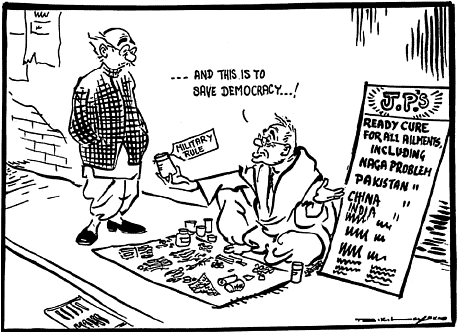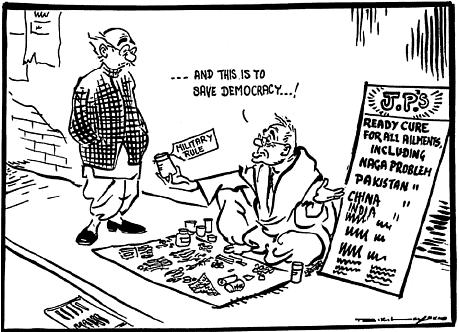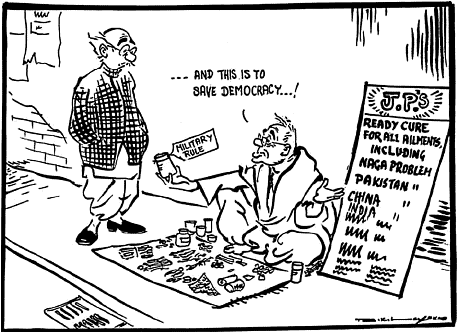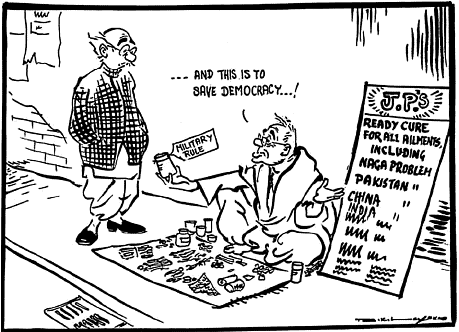Test: The Crisis of Democratic Order- Case Based Type Questions - Humanities/Arts MCQ
16 Questions MCQ Test Political Science Class 12 - Test: The Crisis of Democratic Order- Case Based Type Questions
Study the cartoon carefully and give the answers to the question that follows:

Q. Choose the correct option of the following to save democracy.

Study the cartoon carefully and give the answers to the question that follows:

Q. Military rule and democracy can’t work together:

| 1 Crore+ students have signed up on EduRev. Have you? Download the App |
Study the cartoon carefully and give the answers to the question that follows:

Q. What does this picture depict?

Study the cartoon carefully and give the answers to the question that follows:

Q. What are the problems faced by the democratic government?
Read the following paragraph and answer the questions that follows:
Students’ protests in Gujarat and Bihar, both of which were Congress ruled States, had far reaching impact on the politics of the two States and national politics. In January 1974 students in Gujarat started an agitation against rising prices of food grains, cooking oil and other essential commodities, and against corruption in high places. The students’ protest was joined by major opposition parties and became widespread leading to the imposition of President’s rule in the state. The opposition parties demanded fresh elections to the state legislature. Morarji Desai, a prominent leader of Congress (O), who was the main rival of Indira Gandhi when he was in the Congress, announced that he would go on an indefinite fast if fresh elections were not held in the State. Under intense pressure from students, supported by the opposition political parties, assembly elections were held in Gujarat in June 1975. The Congress was defeated in this election.
Q. What was the implication of the Gujarat protest?
Read the following paragraph and answer the questions that follows:
Students’ protests in Gujarat and Bihar, both of which were Congress ruled States, had far reaching impact on the politics of the two States and national politics. In January 1974 students in Gujarat started an agitation against rising prices of food grains, cooking oil and other essential commodities, and against corruption in high places. The students’ protest was joined by major opposition parties and became widespread leading to the imposition of President’s rule in the state. The opposition parties demanded fresh elections to the state legislature. Morarji Desai, a prominent leader of Congress (O), who was the main rival of Indira Gandhi when he was in the Congress, announced that he would go on an indefinite fast if fresh elections were not held in the State. Under intense pressure from students, supported by the opposition political parties, assembly elections were held in Gujarat in June 1975. The Congress was defeated in this election.
Q. When did the assembly elections in Gujarat took place after the pressure of the protests?
Read the following paragraph and answer the questions that follows:
Students’ protests in Gujarat and Bihar, both of which were Congress ruled States, had far reaching impact on the politics of the two States and national politics. In January 1974 students in Gujarat started an agitation against rising prices of food grains, cooking oil and other essential commodities, and against corruption in high places. The students’ protest was joined by major opposition parties and became widespread leading to the imposition of President’s rule in the state. The opposition parties demanded fresh elections to the state legislature. Morarji Desai, a prominent leader of Congress (O), who was the main rival of Indira Gandhi when he was in the Congress, announced that he would go on an indefinite fast if fresh elections were not held in the State. Under intense pressure from students, supported by the opposition political parties, assembly elections were held in Gujarat in June 1975. The Congress was defeated in this election.
Q. When did the students start the protest in Gujarat?
Read the following paragraph and answer the questions that follows:
Students’ protests in Gujarat and Bihar, both of which were Congress ruled States, had far reaching impact on the politics of the two States and national politics. In January 1974 students in Gujarat started an agitation against rising prices of food grains, cooking oil and other essential commodities, and against corruption in high places. The students’ protest was joined by major opposition parties and became widespread leading to the imposition of President’s rule in the state. The opposition parties demanded fresh elections to the state legislature. Morarji Desai, a prominent leader of Congress (O), who was the main rival of Indira Gandhi when he was in the Congress, announced that he would go on an indefinite fast if fresh elections were not held in the State. Under intense pressure from students, supported by the opposition political parties, assembly elections were held in Gujarat in June 1975. The Congress was defeated in this election.
Q. Which party did Morarji Desai belong to?
Read the following excerpt and answer the questions that follows:
In 1967 a peasant uprising took place in the Naxalbari police station area of Darjeeling hills district in West Bengal under the leadership of the local cadres of the Communist Party of India (Marxist). Beginning from the Naxalbari police station, the peasant movement spread to several states of India and came to be referred broadly as the Naxalite Movement. In 1969, they broke off from the CPI (M) and a new party, Communist Party (Marxist-Leninist) (CPI-ML), was formed under the leadership of Charu Majumdar. It argued that democracy in India was a sham and decided to adopt a strategy of protracted guerrilla warfare in order to lead to a revolution. Currently, about 75 districts in nine States are affected by Naxalite violence. Most of these are very backward areas inhabited by Adivasis.
Q. What was this peasant movement called later?
Read the following excerpt and answer the questions that follows:
In 1967 a peasant uprising took place in the Naxalbari police station area of Darjeeling hills district in West Bengal under the leadership of the local cadres of the Communist Party of India (Marxist). Beginning from the Naxalbari police station, the peasant movement spread to several states of India and came to be referred broadly as the Naxalite Movement. In 1969, they broke off from the CPI (M) and a new party, Communist Party (Marxist-Leninist) (CPI-ML), was formed under the leadership of Charu Majumdar. It argued that democracy in India was a sham and decided to adopt a strategy of protracted guerrilla warfare in order to lead to a revolution. Currently, about 75 districts in nine States are affected by Naxalite violence. Most of these are very backward areas inhabited by Adivasis.
Q. How many states are currently affected by the Naxalite Movement?
Read the following excerpt and answer the questions that follows:
In 1967 a peasant uprising took place in the Naxalbari police station area of Darjeeling hills district in West Bengal under the leadership of the local cadres of the Communist Party of India (Marxist). Beginning from the Naxalbari police station, the peasant movement spread to several states of India and came to be referred broadly as the Naxalite Movement. In 1969, they broke off from the CPI (M) and a new party, Communist Party (Marxist-Leninist) (CPI-ML), was formed under the leadership of Charu Majumdar. It argued that democracy in India was a sham and decided to adopt a strategy of protracted guerrilla warfare in order to lead to a revolution. Currently, about 75 districts in nine States are affected by Naxalite violence. Most of these are very backward areas inhabited by Adivasis.
Q. In which area peasant uprising took place in 1967?
Read the following excerpt and answer the questions that follows:
In 1967 a peasant uprising took place in the Naxalbari police station area of Darjeeling hills district in West Bengal under the leadership of the local cadres of the Communist Party of India (Marxist). Beginning from the Naxalbari police station, the peasant movement spread to several states of India and came to be referred broadly as the Naxalite Movement. In 1969, they broke off from the CPI (M) and a new party, Communist Party (Marxist-Leninist) (CPI-ML), was formed under the leadership of Charu Majumdar. It argued that democracy in India was a sham and decided to adopt a strategy of protracted guerrilla warfare in order to lead to a revolution. Currently, about 75 districts in nine States are affected by Naxalite violence. Most of these are very backward areas inhabited by Adivasis.
Q. Which party was formed under the leadership of Charu Majumdar?
Read the following passage carefully and answer the questions that follows:
Normally, it should have been held more than a year earlier. But in the summer of 1975, Indira Gandhi had imposed the Emergency, suspending Indian democracy and making fundamental rights inoperative. During the 19-months nightmare, she had postponed elections not once, but twice. And then, as abruptly and unexpectedly as she had issued the Emergency proclamation, on January 18, 1977, she announced that the Lok Sabha elections would take place in March. For this purpose, she relaxed the rules of the Emergency, lifted press censorship, permitted public meetings and released from jail tens of thousands of members of the political opposition. Some of her inveterate critics believe to this day that she opted for the elections because she believed, or was persuaded by her intelligence agencies to believe, that she would win. Even if this were so-which is doubtful because, for all her faults, she was not so naive-two major and unexpected events immediately after the announcement of the poll must have shattered any illusion.
Q. When was the Lok Sabha elections date announced?
Read the following passage carefully and answer the questions that follows:
Normally, it should have been held more than a year earlier. But in the summer of 1975, Indira Gandhi had imposed the Emergency, suspending Indian democracy and making fundamental rights inoperative. During the 19-months nightmare, she had postponed elections not once, but twice. And then, as abruptly and unexpectedly as she had issued the Emergency proclamation, on January 18, 1977, she announced that the Lok Sabha elections would take place in March. For this purpose, she relaxed the rules of the Emergency, lifted press censorship, permitted public meetings and released from jail tens of thousands of members of the political opposition. Some of her inveterate critics believe to this day that she opted for the elections because she believed, or was persuaded by her intelligence agencies to believe, that she would win. Even if this were so-which is doubtful because, for all her faults, she was not so naive-two major and unexpected events immediately after the announcement of the poll must have shattered any illusion.
Q. Who persuaded Indira Gandhi to believe that she will win 1977 elections?
Read the following passage carefully and answer the questions that follows:
Normally, it should have been held more than a year earlier. But in the summer of 1975, Indira Gandhi had imposed the Emergency, suspending Indian democracy and making fundamental rights inoperative. During the 19-months nightmare, she had postponed elections not once, but twice. And then, as abruptly and unexpectedly as she had issued the Emergency proclamation, on January 18, 1977, she announced that the Lok Sabha elections would take place in March. For this purpose, she relaxed the rules of the Emergency, lifted press censorship, permitted public meetings and released from jail tens of thousands of members of the political opposition. Some of her inveterate critics believe to this day that she opted for the elections because she believed, or was persuaded by her intelligence agencies to believe, that she would win. Even if this were so-which is doubtful because, for all her faults, she was not so naive-two major and unexpected events immediately after the announcement of the poll must have shattered any illusion.
Q. When was the Emergency imposed in India?
Read the following passage carefully and answer the questions that follows:
Normally, it should have been held more than a year earlier. But in the summer of 1975, Indira Gandhi had imposed the Emergency, suspending Indian democracy and making fundamental rights inoperative. During the 19-months nightmare, she had postponed elections not once, but twice. And then, as abruptly and unexpectedly as she had issued the Emergency proclamation, on January 18, 1977, she announced that the Lok Sabha elections would take place in March. For this purpose, she relaxed the rules of the Emergency, lifted press censorship, permitted public meetings and released from jail tens of thousands of members of the political opposition. Some of her inveterate critics believe to this day that she opted for the elections because she believed, or was persuaded by her intelligence agencies to believe, that she would win. Even if this were so-which is doubtful because, for all her faults, she was not so naive-two major and unexpected events immediately after the announcement of the poll must have shattered any illusion.
Q. For what purpose the rules of emergency were relaxed?
|
34 videos|246 docs|52 tests
|
|
34 videos|246 docs|52 tests
|












